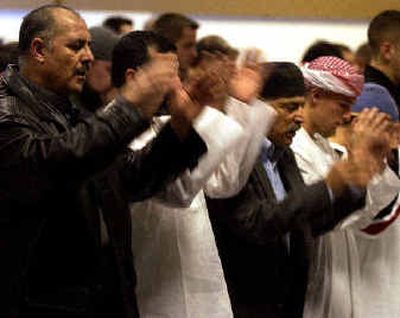Muslims greet end of Ramadan

In what was perhaps Spokane’s most diverse religious gathering of the year, Muslims celebrated the end of the holy month of Ramadan on Sunday by praying and feasting.
About 400 people gathered in the Sacred Heart Medical Center auditorium for the annual Eid al-Fitr, festival of breaking the fast, which ends a month of daylight fasting and reflection.
Here were immigrants from India, Pakistan, Seychelles, Bosnia, Africa and the Arab world as well as African-American and white converts to Islam.
Leading them in prayer was Imam Hamdi, one of hundreds of holy men dispatched at Egypt’s expense from Al-Azhar University of Cairo to fill the religious needs of Muslims the world over.
While religious holidays such as Christmas and Hanukkah have grown increasingly commercial, Ramadan, which begins and ends with the sighting of the new moon, has retained its emphasis on self-sacrifice and contemplation of Allah.
This year, the U.S. presidential election, which fell during Ramadan, added even more solemnity for American Muslims. A recent poll for the Council on American-Islamic Relations found that 29 percent of Americans strongly or somewhat agree that Muslims teach their children to hate. It also found that 27 percent believe Muslims value life less than other people.
Amgad Helmy, a member of the Spokane Islamic Center and a medical resident at Sacred Heart, said that most Muslims – who share with Republicans a conservative view of such issues as abortion, gay marriage and family values – supported George W. Bush in the 2000 election. This year, because of civil rights concerns following 9/11, most Muslims supported Kerry, said Helmy, a native of Egypt.
As Spokane-area Muslims arrived Sunday for the Eid, men and women were separated by blinds erected through the center of the auditorium. They sat, facing east, on sheets of cloth that had been put down on the floor and waited for Hamdi to begin prayers.
Few Islamic traditions are as difficult for a Westerner to understand as this sexual segregation at social religious events, but a Muslim does not view this as an issue of equality. It is simply what the Quran advises.
“Mingling leads to bad things,” said Fahad Mohiuddin, a native of southern India. “Humans are made to commit sin and are subject to temptation.”
The Muslim idea of sin, he said, can be committed by thought alone, and only through faith can one overcome the natural temptation to sin. Ramadan, Mohiuddin said, is all about controlling your will and contemplating the nature of Allah.
As the imam began to chant, the crowd followed him in prayer, alternately standing and kneeling.
“I bear witness that there is no God but Allah … and Muhammad is his servant and his messenger,” Hamdi said, beginning his sermon.
He admonished the faithful to remember those in need and those who are oppressed all over the world. He told them to take a census of Muslims living in the area to aid in planning a mosque, a Muslim cemetery and, eventually, a school.
“I pray to Allah to save the whole world from the weapons of mass destruction,” he said. “I pray to Allah to save humanity from wars and terrorism whether committed by individuals, groups or governments. I pray to Allah to remove the oppressors, dictators and occupiers from all lands, especially from the Muslim world.”
And then each in the crowd turned to someone else for an extended period of hugging and greeting before sitting down to eat. Hamdi sat at the head table with board members of the Spokane Islamic Center and their guest, Sacred Heart’s chief executive, Skip Davis.
The auditorium filled with laughter and the smell of spiced dishes from around the world. “That one,” said a man from the Seychelles pointing to a bowl of curried goat, “will make you remember heaven.”
As some children ran to and fro, others recited verses from the Quran in Arabic over the public address system.
For the most part, Muslims are treated well in America, said Alaaeldin Aamer, a board member of the Spokane Islamic Center, but there are some people in every country who discriminate out of ignorance.
The Council on American-Islamic relations has reported that hate crimes and discriminatory acts against Muslim Americans have increased 70 percent this year over last.
Aamer prescribes knowledge as an antidote for bias.
“What are you going to lose if you read different opinions about Islam?” he asked.